Quick Summary
This article breaks down the key differences between Yousign and DocuSign, two of the biggest names in e-signatures. Yousign is a simple, compliance-focused tool for European businesses, while DocuSign offers advanced automation at a higher cost. But what if you need something in between? SignWell provides a streamlined, affordable alternative. Explore our blog for more insights on tools that best fit your business.
Exploring the Digital Signature Market and Finding the Right E-Signature Tool for You
The digital signature market is booming! It’s projected to grow from $9.93 billion in 2024 to a staggering $70.24 billion by 2030, with a compound annual growth rate of 38.5%. This rapid growth shows just how much businesses are turning to digital signatures to make their processes more efficient and secure.
When it comes to choosing the right e-signature solution, picking the best tool for your business is key. Whether you’re closing deals, onboarding employees, or handling contracts, the right tool matters. Yousign and DocuSign both promise secure, legally binding signatures, but they take different approaches.
At SignWell, we know choosing an e-signature software isn’t just about features. It’s about what actually fits your workflow. We’ll help you compare Yousign and DocuSign’s pricing, features, and usability. The goal is to help you choose the one that works best for your business.
Why Listen to Us?
At SignWell, we specialize in e-signatures. We’ve helped thousands of businesses streamline their signing process with a simple, legally binding, and cost-effective solution. We know what matters when choosing an e-signature tool, and we’re here to give you a clear, unbiased comparison of Yousign vs. DocuSign.
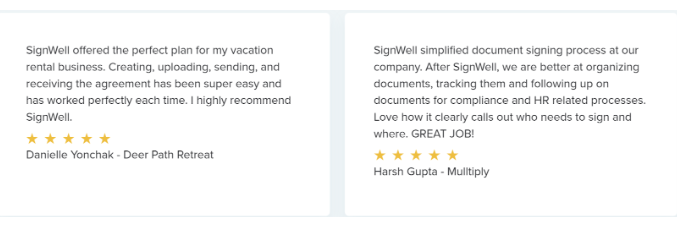
Yousign vs. DocuSign: Key Differences
1. Market Focus
Yousign is built for small and mid-sized European businesses that need legally compliant, straightforward e-signature solutions. It prioritizes eIDAS compliance, making it an attractive choice for companies operating in the European market. Plus, its feature set is designed for essential document workflows rather than complex automation.
DocuSign, on the other hand, is a global enterprise solution catering to businesses of all sizes, including multinational corporations and regulated industries. Its broad market focus means it supports extensive integrations, industry-specific compliance (e.g., finance, healthcare), and advanced automation.
- Yousign fits SMBs that need a simple, compliant e-signature tool.
- DocuSign is built for enterprises requiring global reach, deep integrations, and workflow customization.
2. Compliance and Legal Framework
Yousign is designed for businesses operating in Europe and adheres to eIDAS regulations, ensuring legally binding electronic signatures across the EU. It also complies with GDPR, guaranteeing secure data handling and storage within European jurisdictions. These compliance measures make it a strong choice for organizations needing strict EU regulatory alignment.
DocuSign, in contrast, is built for global legal compliance. It supports eIDAS, UETA, ESIGN Act, and region-specific regulations for finance, healthcare, and government sectors. Enterprises working across multiple jurisdictions often favor DocuSign for its ability to meet complex regulatory requirements beyond Europe.
- Yousign: Best for businesses requiring EU-specific compliance, ensuring eIDAS and GDPR adherence with data stored in Europe.
- DocuSign: Designed for businesses with global operations, offering compliance certifications for industries like finance, healthcare, and government.
3. Features and Functionality
Yousign focuses on core e-signature functionality with a streamlined, user-friendly experience. It offers legally binding signatures, automated reminders, audit trails, and templates. The platform is designed for fast adoption by small and mid-sized teams that need a simple, compliance-driven signing process without unnecessary complexity.
DocuSign, by contrast, is feature-rich and built for enterprise workflows. It extends beyond e-signatures with AI-powered contract analysis, advanced workflow automation, and deep CRM integrations. Businesses needing customizable approval sequences, bulk signing, or intelligent contract management benefit from DocuSign’s comprehensive toolkit.
- Yousign: Ideal for SMBs needing a lightweight, compliance-focused e-signature solution without overwhelming options.
- DocuSign: Suited for enterprises requiring extensive automation, AI-driven insights, and contract lifecycle management.
4. Integrations and API
Yousign offers basic signature API functionality and limited third-party integrations, making it suitable for businesses that need a standalone e-signature tool or light workflow automation. It integrates with some productivity tools but lacks deep connectivity with enterprise platforms like CRMs or ERP systems.
DocuSign provides extensive integration capabilities with tools like Salesforce, Microsoft 365, Google Workspace, and SAP. Its robust API allows for deep customization, enabling businesses to embed e-signatures directly into custom workflows, apps, and automation systems.
- Yousign: Best for businesses that need straightforward e-signatures with minimal setup and no dependency on external integrations.
- DocuSign: Ideal for companies that require seamless API connectivity and advanced workflow automation across multiple business tools.
5. User Experience and Learning Curve
Yousign is designed for simplicity and ease of use, making it a great choice for businesses that want a no-fuss e-signature solution. Its interface is clean, and intuitive, and requires minimal training, allowing teams to get started quickly without technical expertise.
DocuSign, on the other hand, offers a feature-rich but complex experience. While powerful, its extensive options and deep customization capabilities create a steeper learning curve. New users often need training to navigate advanced workflows, automation, and integrations effectively.
- Yousign: Ideal for businesses that prioritize quick adoption and a frictionless signing experience.
- DocuSign: Best for teams willing to invest time in learning advanced customization and workflow automation.
What Is YouSign?
Yousign is an electronic signature platform that’s changing the way businesses handle agreements with an easy-to-use, secure eSignature solution. It helps companies connect with clients and employees, making approvals faster and simpler.
Thousands of businesses trust Yousign to streamline their workflows, secure their agreements, and improve the experience for everyone involved. It provides legally binding e-signatures that comply with eIDAS regulations, ensuring secure, paperless document workflows.
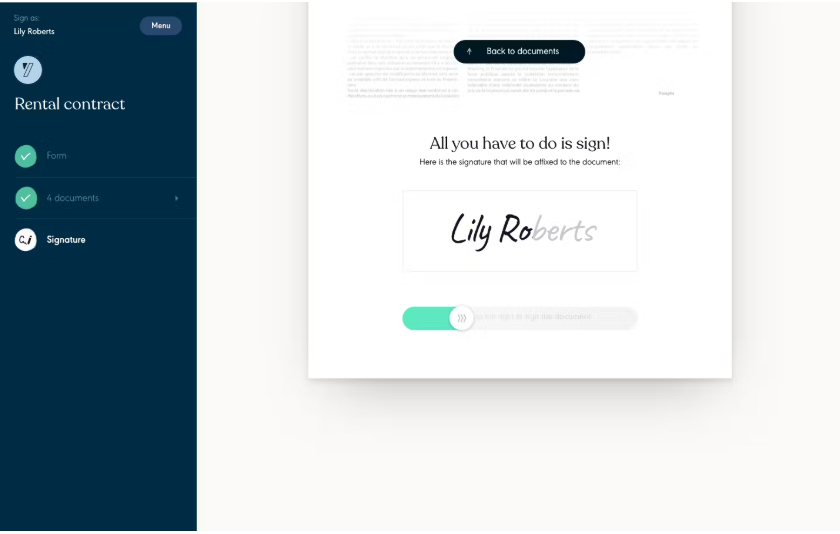
Unlike most enterprise-grade digital signature providers, Yousign prioritizes simplicity, security, and automation for businesses that need an intuitive signing experience. You get important document management tools while maintaining a high level of security with encrypted storage and authentication options.
Key Features
- Legally Binding E-Signatures: Electronic signatures are legal and secure–eIDAS-certified and RGPD-compliant.
- Workflow Automation: Allows the creation of workflows with defined roles and permissions, approvers, and sharing requests for enhanced collaboration.
- Personalized Experiences: Tailors the signature experience uniquely to your brand with customized messages, logos, and language.
- Automated Reminders and Tracking: Sends automatic notifications and provides real-time status updates, ensuring faster signatures and reducing delays.
- Strong Authentication and Audit Trail: Uses two-factor authentication and identity verification to secure signatures, while storing signature activity for legal and security purposes.
Pricing
Yousign offers flexible pricing plans for individuals and teams, with annual billing providing two months free:
- Free Plan, includes two signature requests per month.
- One Plan (€9/month): For individual users with basic features and 10 signature requests.
- Plus Plan (€25/user/month): Offers unlimited eSignatures, templates, and Zapier integration.
Pro Plan (€40/user/month): Adds bulk signing, document collection, and custom workflows.
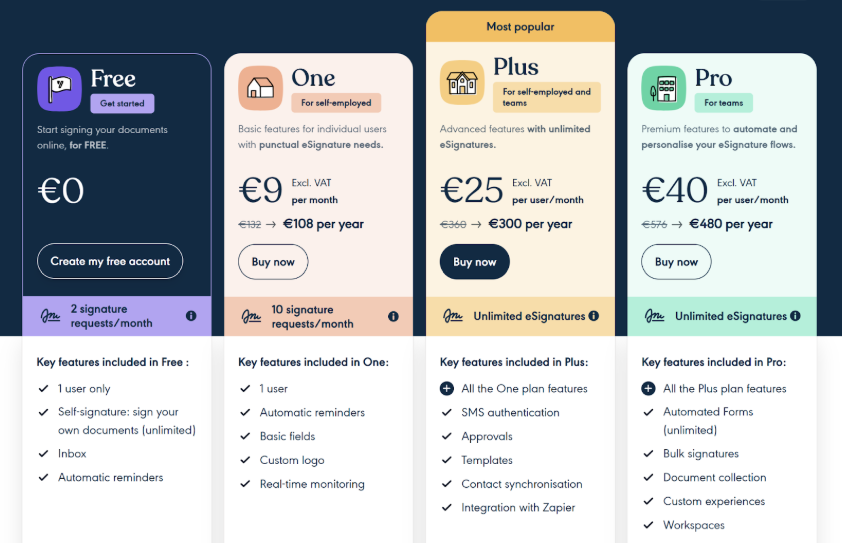
API plans start at €106/month, scaling based on usage and customization needs.
Pros
- Fully eIDAS compliant for European businesses
- Simple and intuitive interface with a minimal learning curve
- Competitive pricing compared to enterprise-level solutions
- Secure authentication with two-factor and ID verification
- Pre-built templates to streamline repetitive document workflows
Cons
- Limited global reach, best suited for European users
- Fewer integrations than competitors like DocuSign
- Lacks advanced automation for large-scale enterprise needs
What Is DocuSign?
DocuSign is a widely used electronic signature platform that allows businesses to sign, send, and manage documents digitally. It supports legally binding agreements worldwide and integrates with numerous applications.
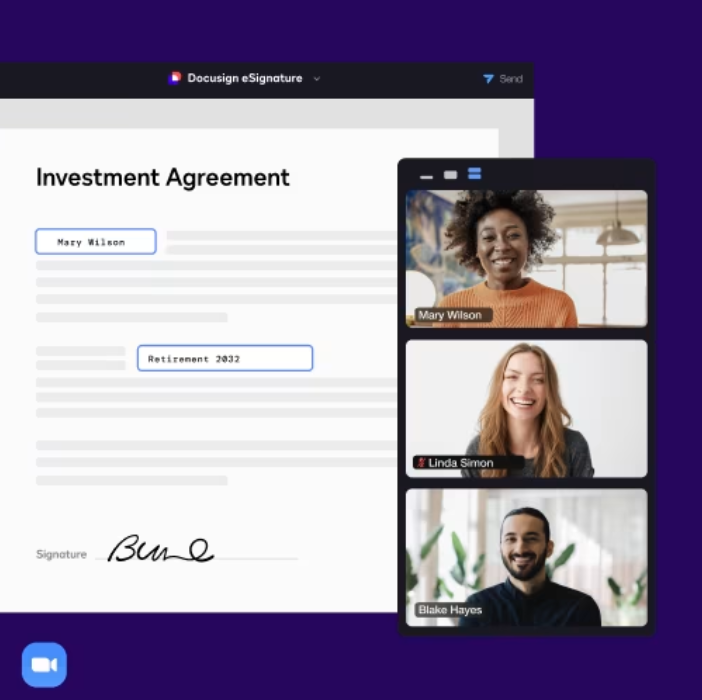
Additionally, Docusign provides advanced automation, extensive API integrations, strong security, identity verification, and signature workflow management. It’s well-suited for large-scale operations, regulated industries, and companies needing customized signing processes.
Key Features
- eSignature: Legally binding electronic signature capability that lets users sign documents from any device, eliminating the need for printing, scanning, or in-person meetings.
- Document Creation: Comprehensive tools to prepare, format, and customize documents for signing, including text fields, date fields, checkboxes, and signature placement indicators.
- Integrations: Seamless connection with popular business software including Salesforce, Microsoft Office 365, Google Workspace, and hundreds of other applications.
- Workflow Automation: Intelligent routing of documents to multiple signers in the correct sequence, with conditional logic available to create complex signing paths.
- API Access: Developer tools and documentation enabling custom integration with existing business systems, websites, and proprietary applications.
- Security: Enterprise-grade encryption, digital certificates, and physical data center security that meets or exceeds industry standards for document protection.
Pricing
DocuSign offers tiered pricing based on features and user needs:
- Personal ($10/month): Allows five signature requests per month.
- Standard ($25/user/month): Includes team collaboration and shared templates.
- Business Pro ($40/user/month): Adds bulk send, payment collection, and conditional logic.
- Enhanced Plans: Custom pricing for enterprise-scale solutions with advanced automation.
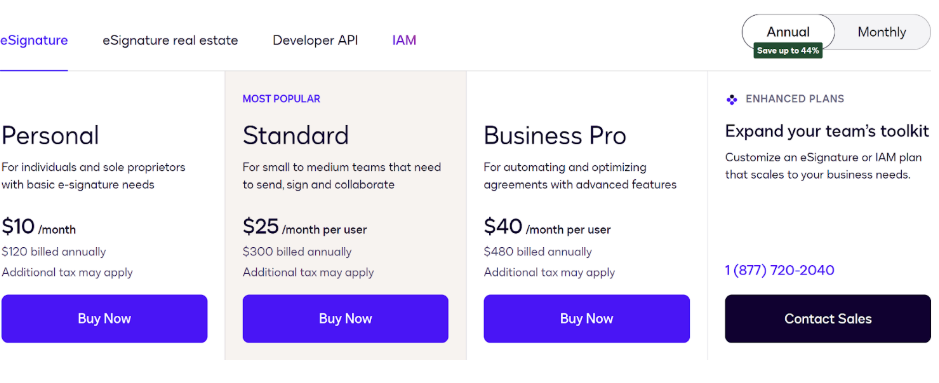
Plans are billed annually with monthly billing options available.
Pros
- Extensive integrations with third-party apps and business platforms
- Strong security with encryption, identity verification, and audit trails
- Mobile-friendly with dedicated apps for signing on the go
- Supports global compliance for international businesses
- Advanced automation for streamlining complex document workflows
Cons
- High pricing for advanced features compared to competitors
- Steep learning curve for businesses needing only basic e-signatures
- Limited customization without API integrations for advanced web forms
- Integration challenges with certain business applications
SignWell: A Better Alternative to Yousign and DocuSign
Yousign and DocuSign both offer solid e-signature solutions, but SignWell provides a simpler, more affordable alternative that still covers all the essentials. If you don’t need enterprise-grade complexity but still want legally binding signatures, secure storage, and smooth integrations, SignWell strikes the perfect balance.
Why Choose SignWell?
Unlike Yousign, SignWell isn’t limited to European regulations, making it a great option for businesses that operate globally. Compared to DocuSign, SignWell keeps things straightforward, so you’re not paying for features you don’t need. It’s built for businesses that want fast, reliable e-signatures without the hassle of high costs or complicated workflows.
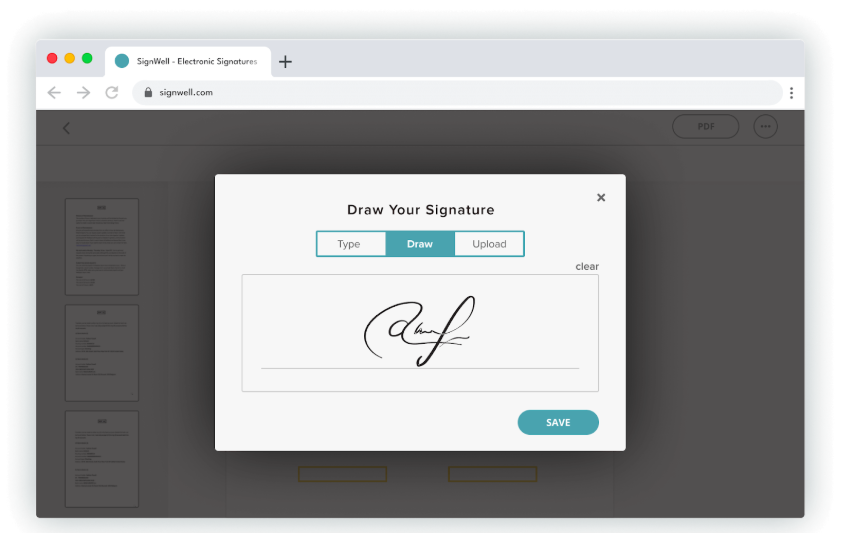
Key Features
-
Unlimited Documents
SignWell allows users on all paid plans to send an unlimited number of documents, enabling businesses to scale without incurring additional costs. This feature ensures that as your document signing needs grow, your expenses remain predictable.
-
Templates
Users can create and reuse document templates, significantly reducing time spent on repetitive agreements and improving efficiency. This functionality streamlines workflows by allowing quick deployment of frequently used documents.
-
Reminders & Notifications
Automated reminders ensure faster turnaround times by keeping signers engaged and reducing delays. These notifications help maintain momentum in the signing process, minimizing the need for manual follow-ups.
-
Custom Branding
Businesses can customize the signing process with their logo, colors, and branding elements, creating a seamless, professional experience for recipients. This personalization enhances brand recognition and trust during the document signing process.
-
In-Person Signing
For situations requiring face-to-face interaction, SignWell enables signers to complete agreements in person, making it ideal for legal, real estate, and HR processes. This feature facilitates immediate signing, ensuring the timely execution of critical documents.
-
Compliance & Security
SignWell ensures legally binding electronic signatures and adheres to industry security standards, including SOC 2 Type 2, HIPAA compliance, and encrypted document storage. These measures guarantee that sensitive data remains protected while maintaining compliance with key regulations.
-
Integrations
While not as extensive as DocuSign, SignWell integrates with over 5,000 applications via Zapier, including popular tools like Slack, Dropbox, and Google Workspace. This makes it easy to incorporate into existing workflows without a complex setup.
-
User Experience
Designed with simplicity in mind, SignWell offers an intuitive, streamlined interface that reduces the learning curve and accelerates adoption. Unlike DocuSign’s feature-heavy dashboard, SignWell keeps the signing process focused, fast, and distraction-free.
Pricing
SignWell offers a free plan with up to three documents per month, great for individuals or occasional users. Additionally, there are two paid plans and an enterprise plan:
- Personal Plan ($12/month) includes unlimited documents and templates.
- Business Plan ($36/month) supports three senders, bulk sending, and custom branding, perfect for teams.
- Enterprise Plan with custom sender pricing for large teams or high-volume signatures.
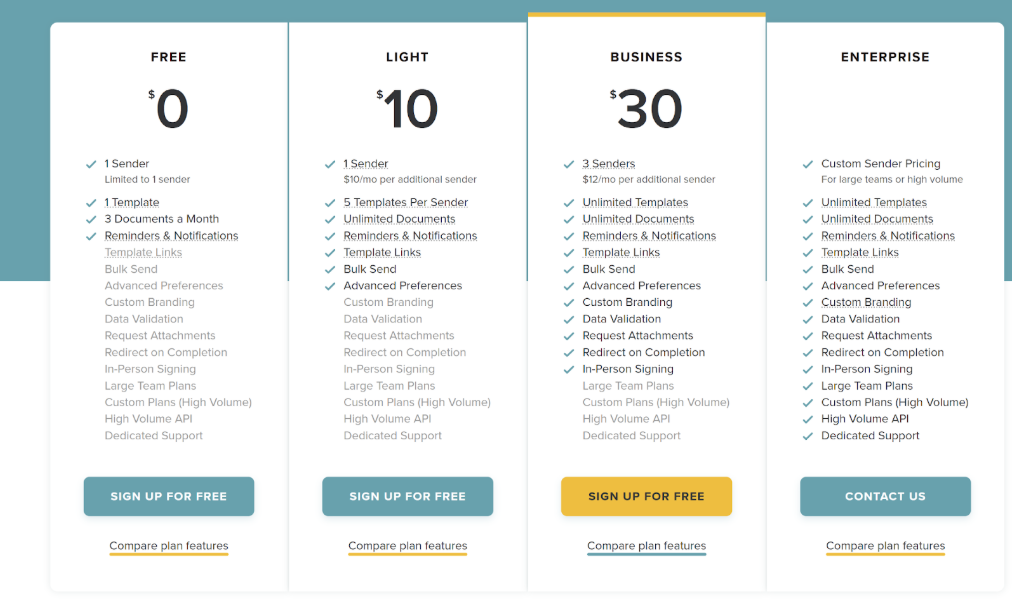
API Pricing
Need e-signatures built into your app or workflow? SignWell’s API pricing is flexible, starting at $18.75 per 50 API documents per month (with the first 25 free). You only pay for what you use—no bloated contracts.
There’s also a Free Developer account to get started with unlimited API test usage, and Enterprise Plans for customized solutions.
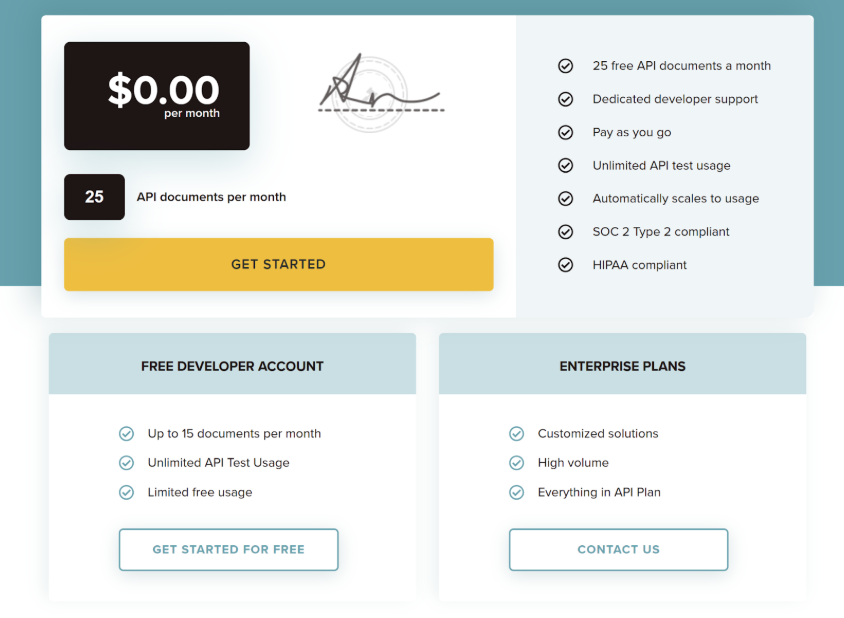
Yousign vs DocuSign vs SignWell Comparison
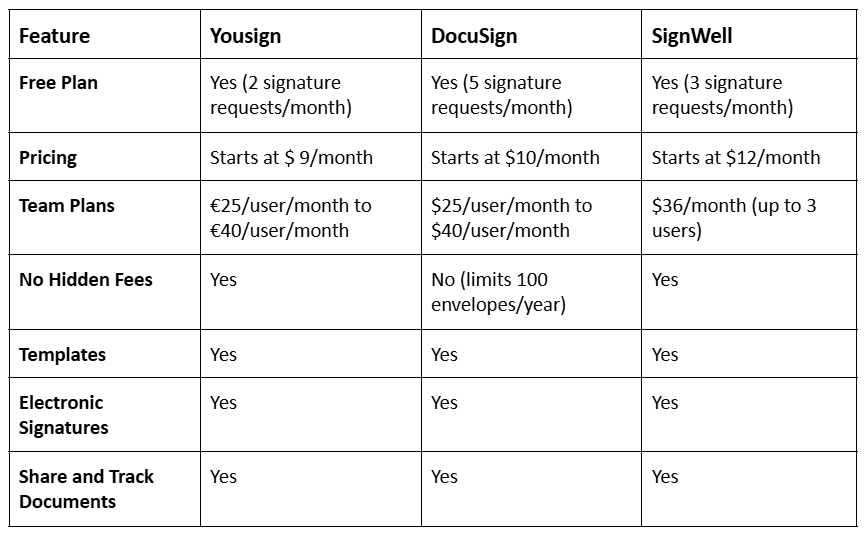
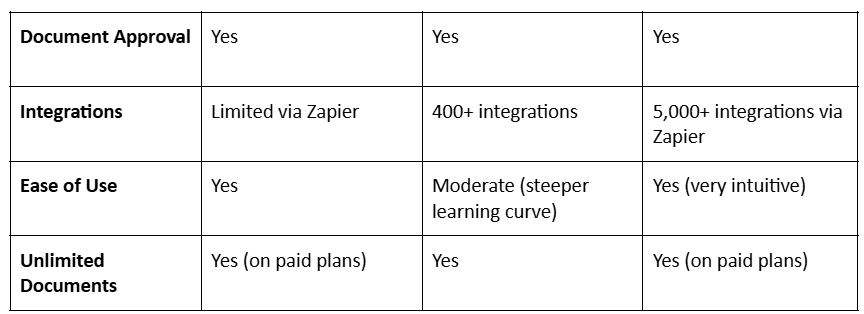
If you’re looking for a cost-effective, easy-to-use alternative to Yousign and DocuSign, SignWell delivers. It’s built for businesses that want a reliable e-signature solution that just works—without the unnecessary extras.
Finding the Best E-Signature Tool for Your Needs
Yousign and DocuSign both get the job done, but they’re built for different users. Yousign is great for small businesses in Europe, while DocuSign offers enterprise-level features at a higher cost. But if you need something simple, affordable, and flexible, there’s another option—SignWell.
SignWell offers legally binding e-signatures without a steep learning curve or bloated pricing. With unlimited documents on paid plans, easy-to-use templates, and secure integrations, it’s a no-fuss solution for businesses that want efficiency without the extra cost.
Get started with SignWell for free and see how easy e-signatures can be.